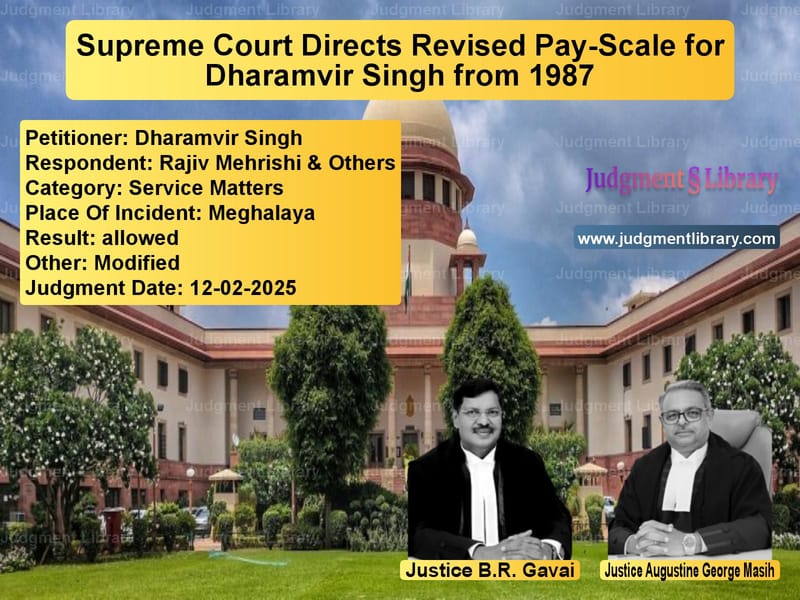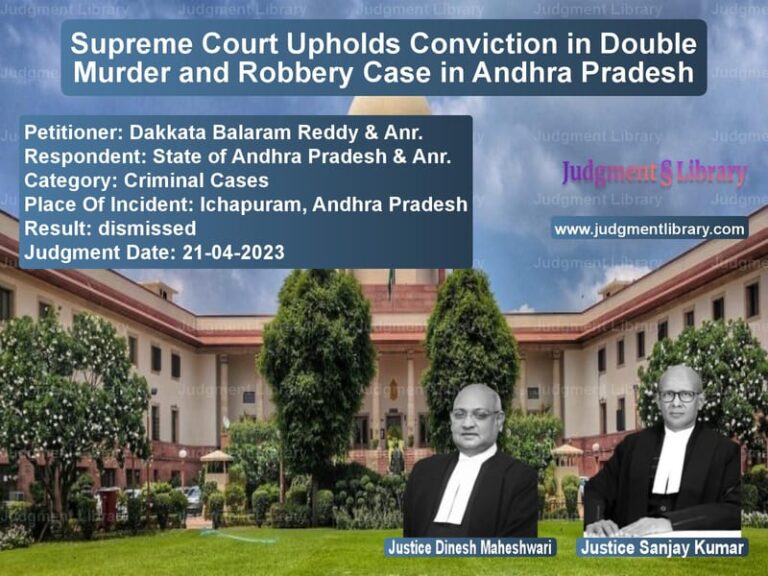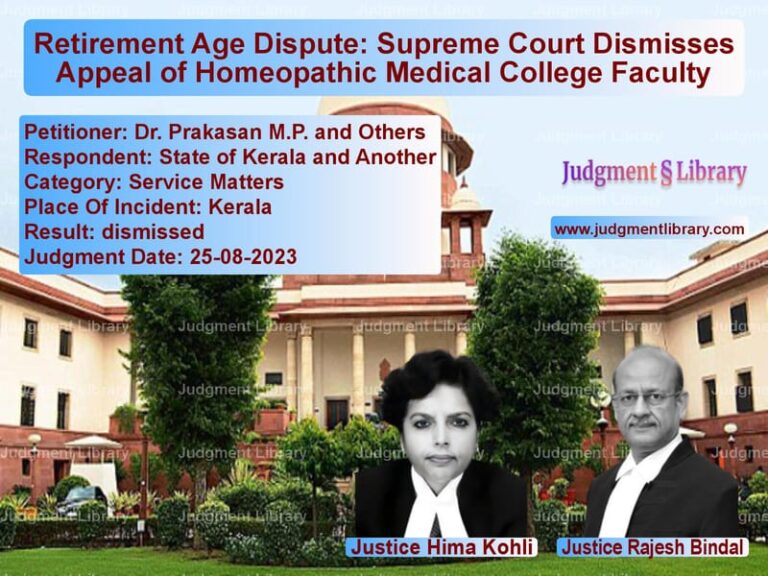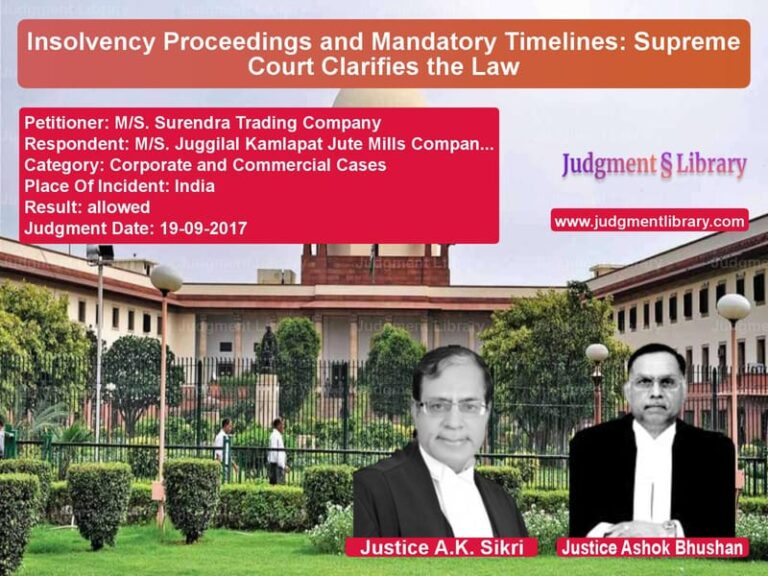Supreme Court Directs Revised Pay-Scale for Dharamvir Singh from 1987
The Supreme Court of India, in its judgment dated February 12, 2025, ruled in favor of Dharamvir Singh, directing the respondents to revise his pay scale from August 19, 1987. The Court found that due to typographical errors in previous orders, the petitioner was wrongfully denied his rightful salary revision for several years. The Court further ordered that arrears be paid to the appellant along with an interest of 6% within three months.
Background of the Case
Dharamvir Singh, the appellant, joined service in 1981 as a Rifleman/Nursing Assistant and was promoted to the post of Draughtsman in 1983. A policy document issued by the respondent in 1984 outlined that Draughtsmen with qualifications equivalent to those in the Central Public Works Department (CPWD) would receive a revised pay scale. In 1994, the policy was amended to base eligibility on experience rather than formal qualifications.
Despite these changes, Dharamvir Singh was not granted the revised pay scale. After multiple attempts to claim his rightful salary adjustments, he filed a writ petition before the Gauhati High Court, Shillong Bench.
High Court’s Decision
The High Court ruled in favor of Dharamvir Singh on November 27, 2012, acknowledging his entitlement to the revised pay scale. However, the court mistakenly recorded the completion of his four-year service period as 1997 instead of 1987. Recognizing this error, Singh filed a review petition, which was allowed on February 8, 2013. Despite this correction, the revised order again mistakenly recorded the year as 1997.
The respondent challenged the High Court’s decision before the Division Bench, which dismissed the appeal on December 16, 2014. A further Special Leave Petition (SLP) before the Supreme Court was also dismissed on May 4, 2017, thereby upholding the High Court’s decision.
Petitioner’s Arguments (Dharamvir Singh)
The petitioner contended that:
- The incorrect recording of the year 1997 instead of 1987 resulted in the wrongful denial of his rightful salary revision.
- The review petition had already acknowledged this mistake, but it was again repeated in the revised order.
- The policy amendment of 1994 allowed for salary revision based on experience, and he met the necessary conditions for the revised pay scale.
- The respondent’s failure to correct the error resulted in financial losses over several decades.
- He should receive his due arrears with interest from 1987, not 1997.
Respondent’s Arguments (Government and Officials)
The respondents, represented by the Additional Solicitor General, argued that:
- The error in the High Court’s order could not be construed as contempt, as no deliberate non-compliance was made.
- The petitioner’s demand for revised pay from 1987 was not explicitly ordered by the previous courts.
- The pay scale revision was subject to government policies and administrative approvals.
Supreme Court’s Observations
The Supreme Court acknowledged the typographical errors in the High Court’s orders and ruled that Dharamvir Singh was indeed entitled to the revised pay scale from 1987.
“It is apparent that both the orders suffered from typographical errors. The appellant, who was otherwise entitled to the revised pay-scale from 1987, cannot be denied the same on account of some technicality.”
The Court further held:
“The appellant was initially appointed in 1983 and he would be entitled to the revised pay-scale mentioned in the policy of 1994. The period of four years to qualify for the revision was completed in 1987, not 1997.”
The Court clarified that the dismissal of the contempt petition by the High Court was justified in a technical sense, as there was no deliberate violation by the respondents. However, the appellant’s rightful claim could not be ignored due to administrative and clerical mistakes.
Final Judgment
The Supreme Court directed:
- The revised pay scale of Dharamvir Singh must be implemented from August 19, 1987.
- The arrears accumulated from 1987 onwards must be paid.
- An interest of 6% per annum must be applied to the arrears.
- The amount must be disbursed within three months from the date of judgment.
Impact of the Judgment
This ruling has significant implications for government employees and service matters:
- Correction of Administrative Errors: The judgment reinforces that technical mistakes in court orders should not be grounds for denial of legitimate claims.
- Judicial Review of Service Matters: The Court reaffirmed its commitment to ensuring fair treatment of employees affected by administrative lapses.
- Interest on Delayed Payments: The judgment emphasizes that employees should be compensated with interest when salary adjustments are wrongfully delayed.
- Guidance on Contempt Petitions: The Court clarified that while technical errors do not amount to contempt, they can still be rectified through appropriate legal avenues.
Conclusion
The Supreme Court’s ruling in Dharamvir Singh vs. Rajiv Mehrishi & Others highlights the judiciary’s role in rectifying errors that lead to financial losses for employees. The judgment not only ensures justice for Dharamvir Singh but also sets a precedent for similar service matters. By ordering the correction of clerical mistakes and directing the payment of arrears with interest, the Court has reinforced its commitment to fair treatment in employment disputes.
Petitioner Name: Dharamvir Singh.Respondent Name: Rajiv Mehrishi & Others.Judgment By: Justice B.R. Gavai, Justice Augustine George Masih.Place Of Incident: Meghalaya.Judgment Date: 12-02-2025.
Don’t miss out on the full details! Download the complete judgment in PDF format below and gain valuable insights instantly!
Download Judgment: dharamvir-singh-vs-rajiv-mehrishi-&-oth-supreme-court-of-india-judgment-dated-12-02-2025.pdf
Directly Download Judgment: Directly download this Judgment
See all petitions in Employment Disputes
See all petitions in Pension and Gratuity
See all petitions in Promotion Cases
See all petitions in Judgment by B R Gavai
See all petitions in Judgment by Augustine George Masih
See all petitions in allowed
See all petitions in Modified
See all petitions in supreme court of India judgments February 2025
See all petitions in 2025 judgments
See all posts in Service Matters Category
See all allowed petitions in Service Matters Category
See all Dismissed petitions in Service Matters Category
See all partially allowed petitions in Service Matters Category







